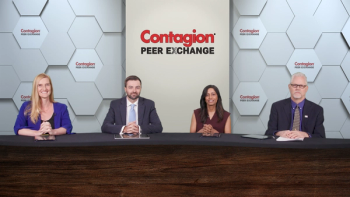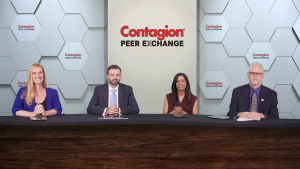Rodney E. Rohde, PhD, MS, SM(ASCP)CM, SVCM, MBCM, FACSc; and Ryan P. McNamara, PhD
Articles by Rodney E. Rohde, PhD, MS, SM(ASCP)CM, SVCM, MBCM, FACSc; and Ryan P. McNamara, PhD

Approaches to equitable and responsible antibiotic management
ByRyan K. Shields, PharmD, MS,Pranita Tamma, MD, MHS,Monica V. Mahoney, PharmD, BCPS, BCIDP, FCCP, FIDSA, FIDP, FMSHP,Rodney E. Rohde, PhD, MS, SM(ASCP)CM, SVCM, MBCM, FACSc; and Ryan P. McNamara, PhD Panelists discuss the urgent need to ensure equitable access to novel antibiotics, highlighting global and domestic disparities, the vital role of stewardship programs, and the importance of innovative distribution models, international collaboration, and systemic reforms to bring lifesaving treatments to resource-limited settings.

Optimizing formulary decisions and new drug approval through data and team collaboration
ByRyan K. Shields, PharmD, MS,Pranita Tamma, MD, MHS,Monica V. Mahoney, PharmD, BCPS, BCIDP, FCCP, FIDSA, FIDP, FMSHP,Rodney E. Rohde, PhD, MS, SM(ASCP)CM, SVCM, MBCM, FACSc; and Ryan P. McNamara, PhD Panelists discuss the complex, systemwide stewardship considerations for incorporating new antibiotics targeting resistant pathogens, emphasizing the need for real-world efficacy data, thoughtful formulary restrictions, and tailored strategies for outpatient use to ensure safe, effective, and sustainable adoption across diverse care settings.

Guiding appropriate use of colistin and polymyxins
ByRyan K. Shields, PharmD, MS,Pranita Tamma, MD, MHS,Monica V. Mahoney, PharmD, BCPS, BCIDP, FCCP, FIDSA, FIDP, FMSHP,Rodney E. Rohde, PhD, MS, SM(ASCP)CM, SVCM, MBCM, FACSc; and Ryan P. McNamara, PhD Panelists discuss how regulatory incentives are advancing antimicrobial development, enabling a shift away from older, toxic agents like colistin, while acknowledging that despite the superiority of newer therapies, polymyxins still retain a limited role in rare, highly resistant infections where no better alternatives exist.

Challenges and opportunities in implementing new antibiotics with QIDP and Fast Track status
ByRyan K. Shields, PharmD, MS,Pranita Tamma, MD, MHS,Monica V. Mahoney, PharmD, BCPS, BCIDP, FCCP, FIDSA, FIDP, FMSHP,Rodney E. Rohde, PhD, MS, SM(ASCP)CM, SVCM, MBCM, FACSc; and Ryan P. McNamara, PhD Panelists discuss how the clinical use of new antibiotics often extends beyond US Food and Drug Administration (FDA)–approved indications, driven by microbiological activity and clinical judgment, while highlighting the role of regulatory incentives like Qualified Infectious Disease Product (QIDP) in accelerating drug development and the need for careful, collaborative interpretation of limited trial data to ensure responsible off-label use.

Integration of susceptibility testing and local surveillance to inform antibiotic use
ByRyan K. Shields, PharmD, MS,Pranita Tamma, MD, MHS,Monica V. Mahoney, PharmD, BCPS, BCIDP, FCCP, FIDSA, FIDP, FMSHP,Rodney E. Rohde, PhD, MS, SM(ASCP)CM, SVCM, MBCM, FACSc; and Ryan P. McNamara, PhD Panelists discuss the challenges of implementing susceptibility testing for new antibiotics, emphasizing the need for close lab-clinician collaboration, streamlined reflex testing protocols, and investment in diagnostic infrastructure to ensure timely and effective treatment of multidrug-resistant infections.

Evidence and trials informing treatment of resistant Gram-negative infections
ByRyan K. Shields, PharmD, MS,Pranita Tamma, MD, MHS,Monica V. Mahoney, PharmD, BCPS, BCIDP, FCCP, FIDSA, FIDP, FMSHP,Rodney E. Rohde, PhD, MS, SM(ASCP)CM, SVCM, MBCM, FACSc; and Ryan P. McNamara, PhD Panelists discuss the evolving landscape of novel antibiotic combinations targeting metallo-β-lactamase (MBL)–producing and other multidrug-resistant Gram-negative bacteria, emphasizing promising early data despite limited clinical trials, the complexity of resistance mechanisms, and the potential for these therapies to improve outcomes and shape future treatment strategies.

Strategies for addressing MBL infections with targeted antibiotic combination therapy, and clinical insights from the REVISIT study
ByRyan K. Shields, PharmD, MS,Pranita Tamma, MD, MHS,Monica V. Mahoney, PharmD, BCPS, BCIDP, FCCP, FIDSA, FIDP, FMSHP,Rodney E. Rohde, PhD, MS, SM(ASCP)CM, SVCM, MBCM, FACSc; and Ryan P. McNamara, PhD Panelists discuss the innovative use of the aztreonam-avibactam combination to combat complex β-lactamase–mediated resistance, highlighting promising laboratory data, challenges in clinical trial enrollment for resistant infections, and the ongoing need for further research to define its role in treating multidrug-resistant Gram-negative pathogens.

Approaches to challenging cases with limited therapies
ByRyan K. Shields, PharmD, MS,Pranita Tamma, MD, MHS,Monica V. Mahoney, PharmD, BCPS, BCIDP, FCCP, FIDSA, FIDP, FMSHP,Rodney E. Rohde, PhD, MS, SM(ASCP)CM, SVCM, MBCM, FACSc; and Ryan P. McNamara, PhD Panelists discuss the real-world challenges of managing infections caused by highly resistant organisms, highlighting the impact of limited access to novel diagnostics and therapeutics, the complexities of outpatient treatment, and the urgent need for broader-spectrum agents and improved delivery methods in resource-constrained settings.

Aligning treatment with risk factors, patient profiles, and MBL status
ByRyan K. Shields, PharmD, MS,Pranita Tamma, MD, MHS,Monica V. Mahoney, PharmD, BCPS, BCIDP, FCCP, FIDSA, FIDP, FMSHP,Rodney E. Rohde, PhD, MS, SM(ASCP)CM, SVCM, MBCM, FACSc; and Ryan P. McNamara, PhD Panelists discuss the critical need for a coordinated, multidisciplinary approach to managing infections caused by metallo-β-lactamase (MBL)–producing organisms, emphasizing early identification, containment, careful selection of limited therapeutic options, and stewardship-guided use of novel agents to preserve their long-term effectiveness.

Guiding empirical therapy through patient risk assessment
ByRyan K. Shields, PharmD, MS,Pranita Tamma, MD, MHS,Monica V. Mahoney, PharmD, BCPS, BCIDP, FCCP, FIDSA, FIDP, FMSHP,Rodney E. Rohde, PhD, MS, SM(ASCP)CM, SVCM, MBCM, FACSc; and Ryan P. McNamara, PhD Panelists discuss practical strategies for empiric antibiotic selection in the face of rising multidrug resistance, stressing the importance of infection confirmation, patient risk assessment, local resistance data, and stewardship-guided use of newer agents to ensure appropriate and sustainable treatment decisions.

The role of rapid diagnostics and collaboration in antibiotic stewardship
ByRyan K. Shields, PharmD, MS,Pranita Tamma, MD, MHS,Monica V. Mahoney, PharmD, BCPS, BCIDP, FCCP, FIDSA, FIDP, FMSHP,Rodney E. Rohde, PhD, MS, SM(ASCP)CM, SVCM, MBCM, FACSc; and Ryan P. McNamara, PhD Panelists discuss the pivotal role of microbiology laboratories and rapid diagnostic technologies in managing multidrug-resistant infections, highlighting their impact on timely treatment, antibiotic stewardship, and the need for interdisciplinary collaboration to effectively interpret and act on resistance data.

Pathogen prevalence, emerging threats, and regional resistance patterns
ByRyan K. Shields, PharmD, MS,Pranita Tamma, MD, MHS,Monica V. Mahoney, PharmD, BCPS, BCIDP, FCCP, FIDSA, FIDP, FMSHP,Rodney E. Rohde, PhD, MS, SM(ASCP)CM, SVCM, MBCM, FACSc; and Ryan P. McNamara, PhD Panelists discuss emerging therapies for multidrug-resistant Gram-negative pathogens, focusing on the rising threat of antimicrobial resistance, evolving resistance mechanisms like extended-spectrum β-lactamases (ESBLs) and New Delhi metallo-β-lactamases (NDMs), regional variability in pathogen prevalence, and the clinical implications for treatment in inpatient and outpatient settings.

Influenza Vaccination With SARS-CoV-2 mRNA Booster Shots
ByRodney E. Rohde, PhD, MS, SM(ASCP)CM, SVCM, MBCM, FACSc; and Ryan P. McNamara, PhD,Wendy Wright, DNP, ANP-BC, FNP-BC, FAANP, FAAN, FNAP,Jacinda C. Abdul-Mutakabbir, PharmD, MPH,Madeline King, PharmD Drs Jacinda Abdul-Mutakabbir, Madeline King, Rodney Rohde, and expert nurse practitioner Wendy Wright provide insight on receiving the influenza vaccine concurrently with the SARS-CoV-2 booster shot, and comment on data on immune responses from the Moderna and Pfizer/BioNTech vaccines.

CDC and FDA Recommendations for SARS-CoV-2 Booster Shots
ByRodney E. Rohde, PhD, MS, SM(ASCP)CM, SVCM, MBCM, FACSc; and Ryan P. McNamara, PhD,Wendy Wright, DNP, ANP-BC, FNP-BC, FAANP, FAAN, FNAP,Jacinda C. Abdul-Mutakabbir, PharmD, MPH,Madeline King, PharmD Experts in the management of SARS-CoV-2 educate on CDC and FDA recommendations for approaching administration of booster vaccines, including those for special patient populations.

Defining SARS-CoV-2 Bivalent Vaccines and Optimizing Protection Through Vaccination
ByRodney E. Rohde, PhD, MS, SM(ASCP)CM, SVCM, MBCM, FACSc; and Ryan P. McNamara, PhD,Wendy Wright, DNP, ANP-BC, FNP-BC, FAANP, FAAN, FNAP,Jacinda C. Abdul-Mutakabbir, PharmD, MPH,Madeline King, PharmD Wendy Wright, DNP, ANP-BC, FNP-BC, FAANP, FAAN, FNAP; Jacinda Abdul-Mutakabbir, PharmD; and Rodney E. Rohde, PhD, MS, SM(ASCP)CM, SVCM, MBCM, FACSc; review what encompasses a bivalent vaccine and give their perspective on how to communicate the role of the vaccine in optimizing protection for patients.

Evolution of SARS-CoV-2 Variants on Booster Shot Development and Formulations
ByRodney E. Rohde, PhD, MS, SM(ASCP)CM, SVCM, MBCM, FACSc; and Ryan P. McNamara, PhD,Wendy Wright, DNP, ANP-BC, FNP-BC, FAANP, FAAN, FNAP,Jacinda C. Abdul-Mutakabbir, PharmD, MPH,Madeline King, PharmD Rodney E. Rohde, PhD, MS, SM(ASCP)CM, SVCM, MBCM, FACSc, leads a discussion on the constant evolution of SARS-CoV-2 variants and the impact on vaccine and booster shot development and administration.

COVID-19 Booster Vaccination Protection Rates
ByRodney E. Rohde, PhD, MS, SM(ASCP)CM, SVCM, MBCM, FACSc; and Ryan P. McNamara, PhD,Wendy Wright, DNP, ANP-BC, FNP-BC, FAANP, FAAN, FNAP,Jacinda C. Abdul-Mutakabbir, PharmD, MPH,Madeline King, PharmD Jacinda Abdul-Mutakabbir, PharmD; Wendy Wright, DNP, ANP-BC, FNP-BC, FAANP, FAAN, FNAP; and Madeline King, PharmD, BCIDP, examine the efficacy and real-world implications of the COVID-19 booster shot in terms of vaccination protection rates.

Impact of SARS-CoV-2 Subvariants on Vaccination
ByRodney E. Rohde, PhD, MS, SM(ASCP)CM, SVCM, MBCM, FACSc; and Ryan P. McNamara, PhD,Wendy Wright, DNP, ANP-BC, FNP-BC, FAANP, FAAN, FNAP,Jacinda C. Abdul-Mutakabbir, PharmD, MPH,Madeline King, PharmD Wendy Wright, DNP, ANP-BC, FNP-BC, FAANP, FAAN, FNAP, leads a discussion on the challenges subvariants of SARS-CoV-2 present in terms of vaccination and approaching optimal communication to the public surrounding vaccination.

Defining Variants of Interest vs Variants of Concern
ByRodney E. Rohde, PhD, MS, SM(ASCP)CM, SVCM, MBCM, FACSc; and Ryan P. McNamara, PhD,Wendy Wright, DNP, ANP-BC, FNP-BC, FAANP, FAAN, FNAP,Jacinda C. Abdul-Mutakabbir, PharmD, MPH,Madeline King, PharmD Expert health professionals share their thoughts on variants of concern vs variants of interest of the SARS-CoV-2 strains as they relate to clinical practice.

Infectious diseases are emerging at an alarmingly rapid pace, faster than any other time in human history.





